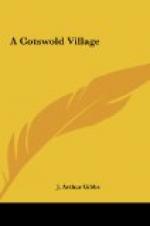At the same moment that I startled this brood out of the rushes a moorhen swam slowly out, accompanied by her mate. It was evident, from her cries and her anxious behaviour, that she too had some young ones in the rushes; and soon two tiny little black balls of fur crawled out from the bank and made for the opposite shore. Either from blindness or fright they did not join their parents in mid stream, but hurried across to the opposite bank and scrambled on to the mud, followed by the old couple remonstrating with them on their foolishness. The mother then succeeded in persuading one of them to follow her to a place of safety underneath some overhanging boughs, but the other was left clinging to the bank, crying piteously. I went round by a bridge in the hope of being able to place the helpless little thing on the water; but, alas! by the time I got to the spot it was dead. The exertion of crossing the stream had been too much for it, for it was probably not twelve hours old.
When there are young ones about, moorhens will not dive to get out of your sight unless their children dive too. It is pretty to see them swimming on the down-stream side of their progeny, buoying them up in case the current should prove too strong and carry them down. If there are eggs still unhatched, the father, when disturbed, takes the little ones away to a safer spot, whilst the mother sticks to the nest. But they are rather stupid, for even the day after the eggs are hatched, on being disturbed by a casual passer-by, the old cock swims out into mid stream. He then calls to his tiny progeny to follow him, though they are utterly incapable of doing so, and generally come to hopeless grief in the attempt. Then the old ones are not very clever at finding children that have been frightened away from the nest. I marked one down on the opposite bank, and could see it crawling beneath some sticks; but the old bird kept swimming past the spot, and appeared to neither hear nor see the little ball of fur. Perhaps he was playing cunning; he may have imagined that the bird was invisible to me, and was trying to divert my attention from the spot.
Moorhens are always interesting to watch. With a pair of field-glasses an amusing and instructive half hour may often be spent by the stream in the breeding season.
I was much amused, while feeding some swans and a couple of wild ducks the other day, to notice that the mallard would attack the swans if they took any food that he fancied. One would have thought that such powerful birds as swans—one stroke of whose wings is supposed to be capable of breaking a man’s leg—would not have stood any nonsense from an unusually diminutive mallard. But not a bit of it: the mallard ruled the roost; all the other birds, even the great swans, ran away from him when he attacked them from behind with his beak. This state of things continued for some days. But after a time the male swan got tired of the game; his patience was exhausted. Watching his opportunity he seized the pugnacious little mallard by the neck and gave him a thundering good shaking! It was most laughable to watch them. It is characteristic of swans that they are unable to look you in the face; and beautiful beyond all description as they appear to be in their proper element, meet them on dry land and they become hideous and uninteresting, scowling at you with an evil eye.




